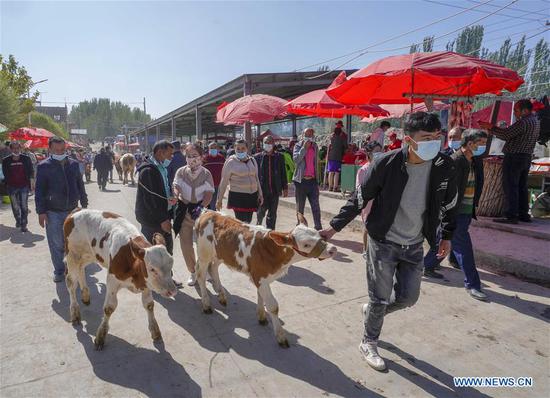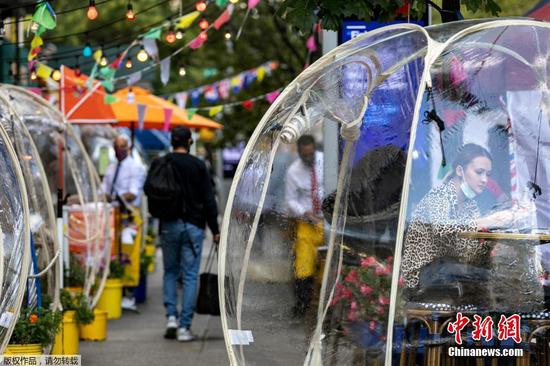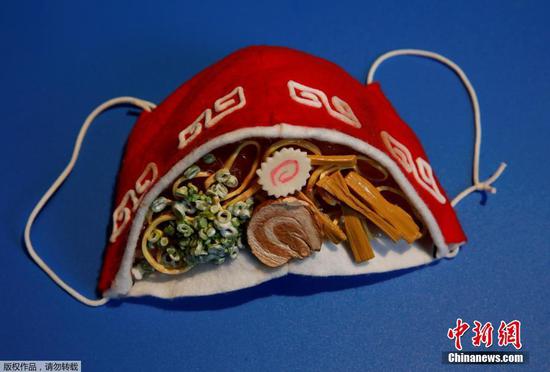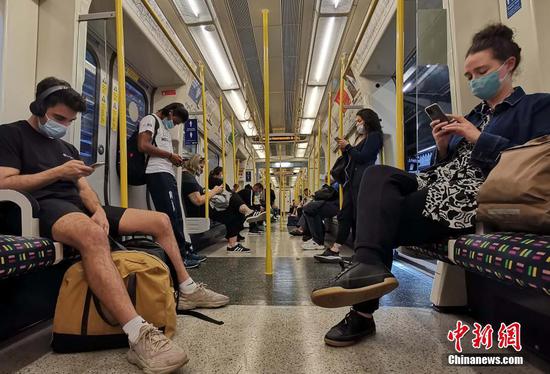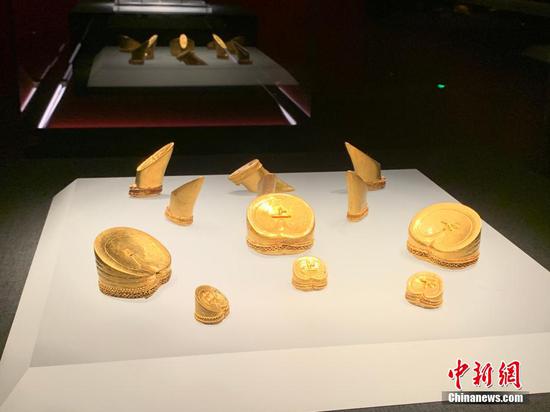
Huimin Street in downtown Xi'an, Shaanxi province, is a mustvisit destination for tourists. [Photo/China News Service]
Diners return in numbers to Xi'an's Muslim Quarter
Under a clear blue sky early this month, Sun Jianping walked on crutches along a street near the 640-year-old Drum Tower, a landmark in downtown Xi'an, Shaanxi province.
The 55-year-old, a warm and gregarious character, was heading to one of the restaurants he owns-Lao Sun Jia, or Old Sun's Place.
The eatery, at the southern end of Huimin Street, is renowned for its paomo (shredded pita bread soaked in mutton or beef soup).
Also known as the Muslim Quarter, Huimin Street is famed in Xi'an, the provincial capital, and nationwide for its flour-based local cuisine and Muslim culture. It is also an area for adventurous food tours, popular among domestic and overseas visitors.
The street is busy throughout the year, with outlets selling roujiamo (beef burgers), huashengsu (peanut pastries) and paomo scattered along the 600-meter thoroughfare. There are some 300 such shops on both sides of the street, mostly owned or rented by residents of the Hui ethnic group.
This year, due to the coronavirus pandemic, Sun, head of the street's chamber of commerce, urged restaurants and vendors to distribute free food to Xi'an residents in March and April.
1234567Next >>|

A diner enjoys a bowl of paomo (shredded pita bread in mutton or beef soup), which is popular in Xi'an. [Photo/Xinhua]
"We've benefited from selling halal food for many years on the street, and when the outbreak spread across the country, it was time to help local residents," said Sun, who uses crutches because he has problems with his feet-the result of years of running.
Huimin Street dates to the Tang Dynasty (618-907), when it was more a neighborhood than a commercial area.
In those days, it was also the seat of the Shangshu Sheng, or Shangshu Ministry, one of the most important central government organs.
Occupying nearly 2.25 square kilometers, the area grew to become a residential community for the Hui people during the Ming Dynasty (1368-1644).
Wang Chao, associate professor of history at the Institute for Western Frontier Region of China at Shaanxi Normal University, said that during the Tang Dynasty Arab merchants traveled the Silk Road to Chang'an, now known as Xi'an.
"Since those times, the Hui ethnic people have lived in the neighborhood, which during the Ming Dynasty was named Hui Fang," he said. In Chinese, fang translates as subdistrict.
The Hui people traditionally live near mosques, which are convenient for prayers. Before the reign of Emperor Qianlong (1736-1795) in the Qing Dynasty (1644-1911), there were seven mosques in Hui Fang. Now, there are 12.
|<>|

Diners eat out in Huimin Street at night. [Photo/for China Daily]
Hui people still fondly refer to the area as Hui Fang, and it is home to more than 20,000 members of this community from 13 neighborhoods, Wang said. The oldest mosque in the area can be traced back 1,278 years.
Xi'an has witnessed wars and turbulence, but Hui Fang survived every time and is still thriving today, the professor added.
Modern revitalization
Liu Chao, 38, founder of an e-commerce platform on Huimin Street, said, "The tourist boom in the area is closely related to long national vacations, including the National Day holiday week, which were introduced by the State Council in 1999.
"Tourists often say that if you don't go to the Muslim Quarter first, you have never been to Xi'an. However, for locals like us, it's an area that primarily sells halal food, and in recent years has become a must-visit place."
Sun, the restaurant owner, was born and raised in the neighborhood. Growing up in a Hui family of more than 30 people, he started his own business in the 1990s, supplying clothing and shoes for major department stores in Xi'an.
"At that time, elderly members of my family told me of a saying that when you have been involved in different types of business, it's good to have a restaurant as your final career choice," he said.
"I had been involved in quite a few lines of work, but none of them made me feel as if I wanted them for a lifetime career."
|<>|

One of the 12 mosques in Huimin Street. [Photo/for China Daily]
Sun, who frequently offers advice to the store owners and vendors in Hui Fang, said an opportunity arose 15 years ago.
"One day in 2005, a restaurant owner on the main street in Hui Fang said he was planning to stop working and asked whether I wanted to take over his business," he said.
"I had to go out of town on a short business trip, but when I returned, he had kept his restaurant for me," Sun said, adding that this was when he decided to start his paomo business.
He now owns two restaurants in the area, with a total of 70 employees. In addition, Sun is responsible for liaison between Huimin Street traders and restaurant associations and eateries in other cities.
"I love talking about Huimin Street, about the variety of halal food that can be found there, about the people selling the food-in short, about everything to do with the street," he said.
About five years ago, Sun decided to step back from the day-to-day running of his restaurants.
"The next generation of restaurant managers and service staff members began to arrive, but they sought advice from me all the time," he said.
|<>|

Noodles with beef soup. [Photo/for China Daily]
Liu, the e-commerce platform founder, said Sun's unbridled enthusiasm for the area has boosted public confidence in Huimin Street's future.
Tourism revival
Tourism in the street, which is located near the Bell and Drum towers in downtown Lianhu district, has gradually returned to normal levels since the pandemic emerged, with outlets reopening on March 17.
Wang Fei, director of Lianhu district bureau of culture and tourism, said, "As efforts continued at the time to help slow the spread of COVID-19 nationwide, we believed the street should get back to normal to help the tourism industry gradually recover."
In the first few weeks, few visitors or restaurant employees were seen on the street, despite businesses being disinfected three times a day and widespread temperature checks in the area.
Ma Jianfeng, manager of Jiasan Steamed Buns Restaurant on Huimin Street, said only the first floor of the five-story eatery was initially opened to customers as trade in the area began to recover.
"We also removed half the tables to limit capacity for diners," he said, adding that the number of tourists visiting the street rose significantly during the five-day May Day holiday.
Shi Weicheng, an 82-year-old native of Xi'an, said he was drawn to Huimin Street in the early 1990s by the range of food on offer.
|<>|

A vendor sells beef burgers in Huimin Street. [Photo/for China Daily]
"I heard the area had some special food that you didn't normally see in the city, so I became very interested in it and started to eat there regularly," he said.
Shi said that when business resumed on the street in March, he was finally able to savor paomo again, adding, "That really made my day."
After pandemic restrictions were lifted, tourists from across the country flocked to the street in numbers once more.
Yin Haixia, 39, who traveled from Xiaogan, Hubei province, for a one-week vacation in Xi'an, said she chose Huimin Street as her final stop.
"The tastes of the Hui community have become entwined with the abundant cultural resources in the area," she said.
"Some new food streets, such as Yongxingfang, have emerged in Xi'an in recent years. I have also been there, but there is no area like Huimin Street that is so rich in culture and community vitality."
Upscale neighborhood
Scraps of food used to be left on the ground in Huimin Street, but this is no longer the case, as several renovation projects have been carried out in the area in the past decade.
In April 2014, the Xi'an authorities started to renovate 12,000 small eateries throughout the city, including those on Huimin Street. As a result, cleanliness standards on streets selling food improved markedly.
|<>|

A food stand on the street. [Photo/for China Daily]
Meanwhile, Zhao Wenye, 25, a Xi'an native, has also noticed some changes each time she orders halal food.
"Some well-established eateries now use high-tech devices to handle orders, providing customers with a new experience when they enjoy traditional food, and also showing that the street is keeping pace with the times," she said.
As Huimin Street became more upscale, rents also rose, forcing some traders to consider other ways to make a living.
In 2016, Liu opened a Huimin Street store on the Taobao e-commerce platform, specializing in several well-known local snacks. He said sales at the online shop have been "fine".
However, he has his worries. "My concern is that due to the traditional mindset and beliefs in the local community, development of our e-commerce platform will have to take place gradually," he said.
He plans to invite restaurants from outside Huimin Street to take part in his online business.
In early July, Wei Ya, a top-selling livestreaming host, anchored a broadcast in Xi'an, during which she presented several dishes from Huimin Street to audiences.
Sun, the restaurant owner and chamber of commerce head, has opened a new food street in Yuanjiacun, Xianyang city, 70 kilometers northwest of Xi'an.
"The street binds us together. Different generations of visitors have been to see it. The gourmet traditions and legacies of our ancestors have been secured. There's a real vibe here," he said.
"The street is also a bridge connecting our community to the outside world."
Jian Mincontributed to this story.
|<















